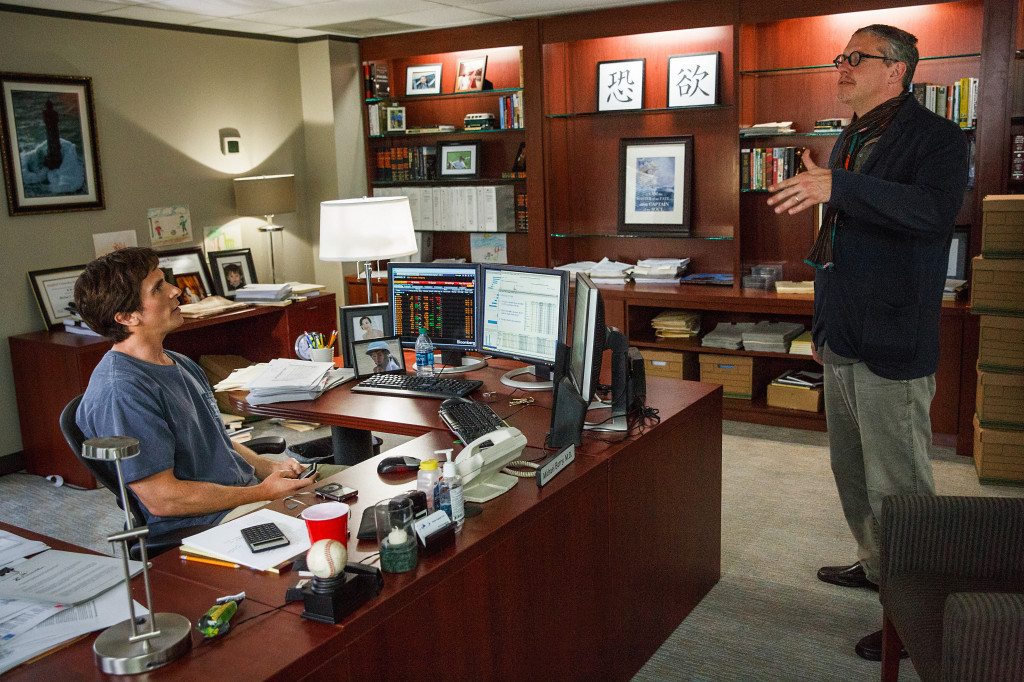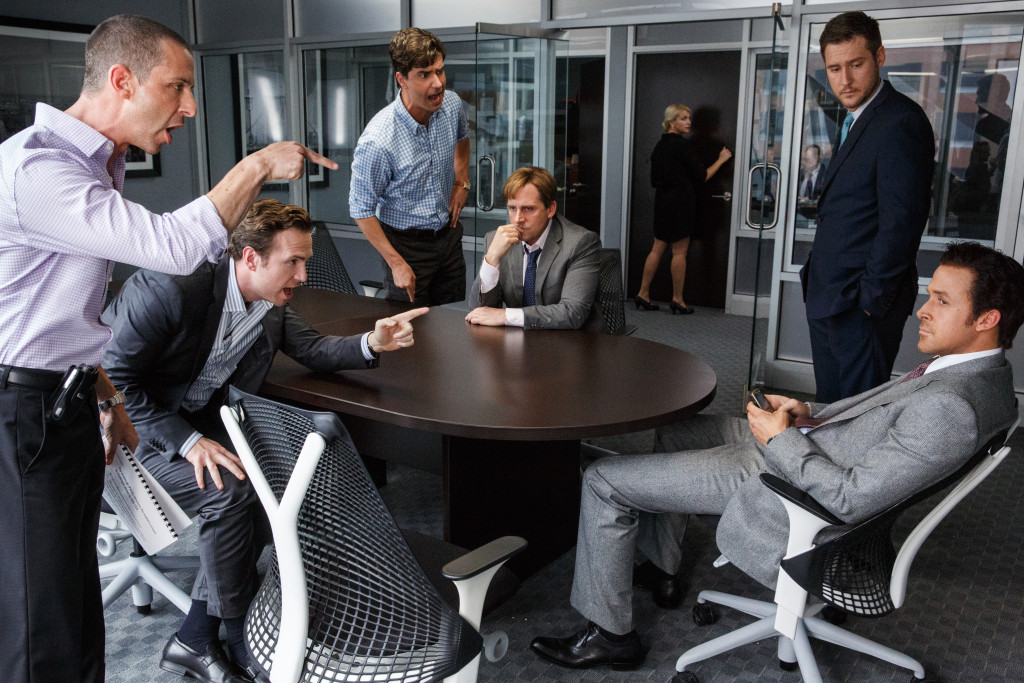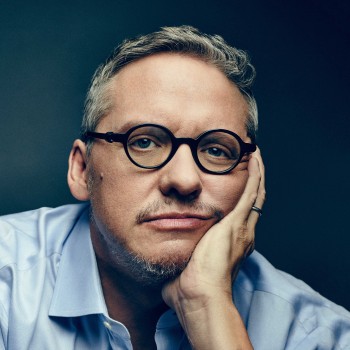Adam McKay is a former head writer for “Saturday Night Live” and is best known for huge comedies starring Will Ferrell which he directed and co-wrote — including “Anchorman” and “Talledega Nights.” But his latest, “The Big Short,” is a drama… and it has earned him an Oscar nomination.
Based on the non-fiction book by Michael Lewis, the movie follows a crew of misfit traders… who anticipate the 2008 housing crisis before anyone else. In the clip below, an angry investment manager confronts one of those traders, played by Christian Bale.
When Brendan met Adam, he asked if — in light of Adam’s resume — he ever considered making this a comedy.

Adam McKay: No, no. I knew from the moment I read the book what I wanted to do with it, what it needed to be. I’m a film fan. I love all kinds of movies, even though I started with comedies. So there’s no question I was looking to do something different, but this book definitely found me, and it was like, “Oh, my god, this has to be made!”
And I don’t think it was until like, halfway through shooting that Cate Hardman, my script supervisor, was like [with a bit of a Southern twang], “Oh, you’re really” — she’s from Texas — “Oh, you’re really doing something different, aren’t you?” And I was like, “Oh, yeah! I never thought of that” because you kind of just do what you need to do, you know?
Brendan Francis Newnam: Well, one of the reasons the movie succeeds is because you manage to take a complex topic, make it approachable. You make it engaging, you keep the pace up. You’re the co-writer of the screenplay. Talk about some of the things you knew that you had to do to kind of keep the energy up for a movie like this.
Adam McKay: The one thing I would say is I put some rocket fuel on it. You know, I definitely, like what I loved about the book was it was such a page-turner. I read it in one night, and was like, “This is crazy that a book about this subject is a page-turner.”
You know, those Erik Larson novels are one thing, about a serial killer at the World’s Fair. That I can see as a page-turner. But when I read this, I was just shocked at the energy in it and I think you’re right. I think there’s a thing you get from comedy, which is there’s no question I’m very comfortable with timing and pacing.

Brendan Francis Newnam: So, part of the secret sauce is, of course, as you mentioned, Michael Lewis’s book. Moneyball, another one of his books, also a really engaging film. You’re a student of storytelling and this sort of thing. What does he have? What is his knack that he’s able to do this?
Adam McKay: Obviously, he’s a great writer. There’s no b.s. to his style. He has a little bit of a journalistic style, and then he just has a great ear for, a great eye for the characters we want to spend time with. And he’s just a guy, when you hang out with him, he’s just really interested in a lot of things, and that energy comes across in his writing. And I think we kind of share that, actually, because I’m kind of that way, too.
Brendan Francis Newnam: I know. I’m getting that vibe from you, too.
Adam McKay: Yeah, I’m interested in a lot of subjects, so…
Brendan Francis Newnam: Do you think part of the energy also came from the seriousness of this topic? I mean, you were successful in Hollywood when this financial crisis hit, but it was happening all around you. Everyone was touched by this, and did that kind of add some, maybe, intensity to all these conversations or just kind of in getting the story right?
Adam McKay: I do. I think it’s like, a larger subject, which is: why don’t people care about this language and this world? There’s about four or five things you have to know about when you’re a human being on planet Earth: You’ve got to know what crap not to eat and what crap to eat, right? You’ve got to know how to take care of yourself, you know, scrub your teeth so they don’t rot out of your head. You’ve got to learn how to deal with other people in a way that doesn’t always end in a fistfight or screaming. And then you’ve got to know how the economy works. Otherwise, it’s going to fall apart, you’re going to lose your house, and you’re going to be like, living in a tent.
Brendan Francis Newnam: This has been the last episode of The Dinner Party Download. You now know everything you need to know.
Adam McKay: Yeah, and, you know, and you could chuck some spirituality, which I would still link with psychology in some way, and mental health. And why is it that your average person on the street would say that’s a boring subject when it’s one of the three primary languages of power in the world.
So, that, really, was the central excitement, was like, “Hey, guys, this is actually really cool! I’m the guy who did ‘Talladega Nights,’ and I’m telling you this is awesome.” And that was really the energy that drove us every day. And, you know, I did, I had family members who lost homes, I had lots of friends who lost jobs. So, we knew the fallout of treating this subject like it’s a bore and how dangerous that was, and certainly a large part of the movie is respectful towards that loss, and we tried to depict it in a sensitive way. But I think it’s why it’s a hybrid movie because it’s a combination of excitement about the subject, excitement about the discovery, and at the same time, tragedy.

Brendan Francis Newnam: You know, Michael Lewis, renowned for making big ideas accessible. This movie is getting lauded partially for making a difficult topic compelling. During the financial crisis, I worked for Marketplace, a business show, and that’s what we did every day, was how do we explain this to the layman? And not to be cynical, but these are important things. We’re adults. Shouldn’t the layman bear some responsibility for understanding these complex topics?
Adam McKay: Well, now you’ve jumped to the second part of what we spent hours and hours talking about, which is: is American culture broken? Is American culture broken in the sense that everything is profit-driven, that every conversation is about selling a product, that everything the news says is driven by a fear of losing ratings?
And that somehow — and I don’t know if that’s intertwined with corporate ownership of news or whatever — but there became this kind of maxim that it’s like, “You don’t want to get that complicated. They’ll turn the channel.” And it’s just not true. It really just isn’t and, you know, the fact that we were able to take these really profoundly seemingly boring subjects and like, fill them with entertainment, makes me think that ABC News could’ve spent five minutes describing this and could’ve used some nifty graphics to tell the public how it went.
You know, why they didn’t, you know, if you’re a little more paranoid, you would say corporate ownership. If you’re a little more practical, which probably I am, I would say afraid of losing ratings and would rather do a story about a dog trapped in an old refrigerator.
Brendan Francis Newnam: All right. Well, look, we have two standard questions we ask our guests on the show, and the first question is: what question do you not like being asked at a dinner party? What question should we not ask you?
Adam McKay: “Is Will Ferrell really as funny in person as he is in his movies?”
Brendan Francis Newnam: And this is because you’ve worked with him for…I mean, your careers are very intertwined.
Adam McKay: I have been asked that question, I’m going to say, without exaggeration, 3,200 times. And it’s a complicated answer because Ferrell’s a human being, and sometimes he’s serious, sometimes he’s pissed off, and then there’s times, yeah, he’s really funny, and we goof around.
And, like, at some point, I told Ferrell, I said, “When people ask me what you’re really like” — or sometimes they’ll ask me like, “Tell me something about Will Ferrell I don’t know” — I said, “Do you care if I just lie?” And about six years ago, he said, “Yes, feel free to lie anytime.”
So, through the years I’ve given crazy answers. Recently I did one on the Huffington Post. I told people about his rare bird collection, and it actually got some pick up. And God, Ferrell was so happy! He just called me, he’s like, “Thank you for that!”
Brendan Francis Newnam: Future interviewers, be warned. You’ve done improv forever. I mean, you cut your teeth doing Second City and on “SNL,” so you’re probably pretty fast on your feet.
Adam McKay: If you ask me what Will Ferrell’s really like, I’m going to lie to you.
Brendan Francis Newnam: So I’m not going to ask you that question. I’ll ask you our second question, which is: tell us something we don’t know. And this could be something that you haven’t shared about yourself in interviews before, or it could just be an interesting fact about the world, like a piece of trivia.
Adam McKay: Ooh, I like that question a lot. Here’s a weird thing I bet you only about six people know about me. I actually studied Hung Gar, Northern Chinese Shaolin kung fu for like, four years. [Ed note: we have no idea if he’s lying about this too.]
Brendan Francis Newnam: Whoa!
Adam McKay: When I was in New York City at “SNL,” as often happens, you get a job, and suddenly I started putting on a ton of weight and…
Brendan Francis Newnam: The hours are brutal, notoriously.
Adam McKay: Notoriously brutal, but yet you’re having a blast, and then you get weeks off, and I’m eating garlic knots and pizza, and I just get as big as a house, and I already was kind of a big guy. So, I’m like, I’ve got to work out! So, my wife’s like, “Well, do something that’s cool, that you actually want to do.” I was like, you know, I’ve always wanted to take a martial art. I ended up hooking up with this sifu — that’s what they call the teachers — Johnny V., Johnny Velasquez was his name.
Brendan Francis Newnam: That’s a great Chinese name.
Adam McKay: Isn’t it? Yeah, he was a Hispanic guy who was a sifu at this place. He was a badass, but he was a good guy. And I studied Subduing the Tiger in the ‘I’ form. That was my kata.
Brendan Francis Newnam: Has that come in handy as a director in Hollywood?
Adam McKay: No, it has never come in handy. I will tell you one funny story. My teacher, Sifu Johnny V., I asked him one time, I go, have you ever had fights where you’ve had to use it? And he had like, three stories where he used it.
But one of them was he was walking down the street and he saw a homeless guy getting beat up by like, five kind of yahoos, and he was like, “Hey! Stop it!” And they’re like, “Screw you!” and they all came at him. And I’m like, well, what happened? He’s like, “What do you think happened? They beat the crap out of me. It was five guys!”


